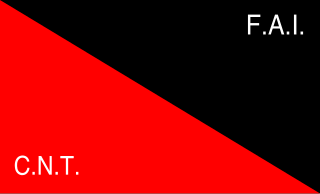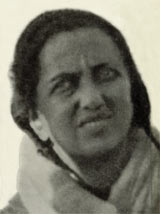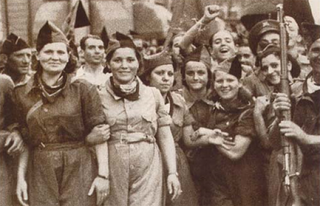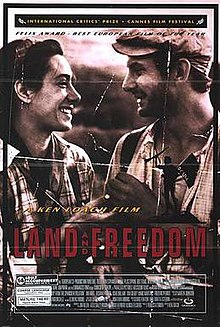
Homage to Catalonia is George Orwell's personal account of his experiences and observations fighting in the Spanish Civil War for the POUM militia of the Republican army.

The Spanish Revolution was a workers' social revolution that began at the outbreak of the Spanish Civil War in 1936 and for two to three years resulted in the widespread implementation of anarchist and, more broadly, libertarian socialist organizational principles throughout various portions of the country, primarily Catalonia, Aragon, Andalusia, and parts of the Valencian Community. Much of the economy of Spain was put under worker control; in anarchist strongholds like Catalonia, the figure was as high as 75%. Factories were run through worker committees, and agrarian areas became collectivized and run as libertarian socialist communes. Many small businesses, such as hotels, barber shops, and restaurants, were also collectivized and managed by their workers.

The Workers' Party of Marxist Unification was a Spanish communist political party formed during the Second Republic and mainly active around the Spanish Civil War. It was formed by the fusion of the Trotskyist Communist Left of Spain and the Workers and Peasants' Bloc against the will of Leon Trotsky, with whom the former broke.

Andreu Nin Pérez was a Spanish communist politician, translator and publicist. In 1937, Nin and the rest of the POUM leadership were arrested by the Moscow-oriented government of the Second Spanish Republic on trumped up charges of collaborating with Francisco Franco's Nationalists and were tortured to death by Soviet NKVD agents. On 17 June 2013, 76 years after his death, the Parliament of Catalonia officially paid homage to him and his work on politics with special emphasis on his work as Justice Minister of Catalonia.
The May Days, sometimes also called May Events, refer to a series of clashes between 3 and 8 May 1937 during which factions on the Republican faction of the Spanish Civil War engaged one another in street battles in various parts of Catalonia, centered on the city of Barcelona.
In 1937, the Nationalists, under the leadership of Francisco Franco began to establish their dominance. An important element of support was their greater access to foreign aid, with their German and Italian allies helping considerably. This came just as the French ceased aid to the Republicans, who continued, however, to be able to buy arms from the Soviet Union. The Republican side suffered from serious divisions among the various communist and anarchist groupings within it, and the communists undermined much of the anarchists' organisation.
The British Independent Labour Party sent a small contingent to fight in the Spanish Civil War. The contingent fought alongside the Workers' Party of Marxist Unification (POUM) and included George Orwell, who subsequently wrote about his experiences in his personal account Homage to Catalonia.
The Durruti Column, with about 6,000 people, was the largest anarchist column formed during the Spanish Civil War. During the first months of the war, it became the most recognized and popular military organisation fighting against Franco, and it is a symbol of the Spanish anarchist movement and its struggle to create an egalitarian society with elements of individualism and collectivism. The column included people from all over the world. Philosopher Simone Weil fought alongside Buenaventura Durruti in the Durruti Column, and her memories and experiences from the war can be found in her book, Écrits historiques et politiques. The Durruti Column was militarised in 1937, becoming part of the 26th Division on 28 April.
Wilebaldo Solano Alonso was a Spanish Communist activist during the Spanish Civil War, especially noted for his work with Socialist youth organizations as a member of the Workers' Party of Marxist Unification (POUM). Most of his activities before and during the Second Spanish Republic were centered in Catalonia.

Revolutionary Catalonia was the part of Catalonia controlled by various anarchist, communist, and socialist trade unions, parties, and militias of the Spanish Civil War period. Although the Generalitat of Catalonia was nominally in power, the trade unions were de facto in command of most of the economy and military forces, which includes the Confederación Nacional del Trabajo which was the dominant labor union at the time and the closely associated Federación Anarquista Ibérica. The Unión General de Trabajadores, the POUM and the Unified Socialist Party of Catalonia were also prominent.
Land and liberty may refer to:

The Madrid Defense Council was an ad-hoc governing body that ran Madrid, Spain, for about six months during the Spanish Civil War (1936–39). It was formed in November 1936 after the Spanish Republican government had fled to Valencia when General Francisco Franco's forces advanced on Madrid. It was expected that the city would fall within a few days, but the arrival of the International Brigades halted the rebel advance, and the situation settled into a stalemate. The council was dominated by communists, who had superior organization and propaganda to the other groups. Their policy was to organize the militias into regular troops and focus on defeating the enemy, rather than to undertake revolutionary activity. As time passed there was growing tension between the communists and more radical groups. The council was dissolved in April 1937 and replaced by a new city council.

Mika Feldman de Etchebéhère was an Argentine militant anarchist and Marxist. She served as captain of the POUM militia during the Spanish Civil War in 1936, and was also active in the anarcha-feminist organization, Mujeres Libres.

Milicianas fought in the Spanish Civil War. They came from a culture with iconic fighters, and where women had been recently empowered through direct political engagement in political organizations and labor unions. The Dictatorship of Primo de Rivera saw women take more to the streets to protest and riot, though their actions were dismissed by male political leaders. The creation of the Second Spanish Republic led to an environment encouraging active political participation in broader Spanish society, and ultimately served to assist many women in their decision to head to the front, as the Government expanded rights for women, including the right to vote, divorce, go to school and stand for election.
Women in the Workers' Party of Marxist Unification, Partido Obrero de Unificación Marxista (POUM), in the Spanish Civil War were faced with many of the same problems as other Communist and Anarchist women in the 1930s, such as hypocrisy of the male leadership in their support of women's rights, while continuing their sexist and patriarchal behavior in private.
Women in the Popular Front in the Spanish Civil War were part of a broad leftist coalition founded ahead of the 1936 Spanish general elections. The Second Spanish Republic represented a changing cultural and political landscape in which women's political organizations could flourish for the first time. It failed to empower women completely, as they were often locked out of governance roles and positions in political organizations. Many organizations continued to discriminate against women, as Marxist ideology did not see them as a unique group with special needs but as part of larger class grouping in which class equality needed to be prioritized.
Women in the Spanish Civil War saw the conflict start on 17 July 1936. The war would impact women's everyday lives. Feminist solutions to problems of women in this period often took an individualistic approach. For women of the Second Republic, by close of the Civil War their efforts for liberation would fail.

The confederal militias were a movement of people's militia organized during the Spanish civil war by the dominant organizations of anarchism in Spain: the National Confederation of Labor (CNT) and the Iberian Anarchist Federation (FAI).

The Central Committee of Antifascist Militias of Catalonia was an administrative body created on July 21, 1936 by the president of the Government of Catalonia, Lluís Companys, under pressure by the anarcho-syndicalists of the National Confederation of Labor (CNT) and Iberian Anarchist Federation (FAI), which led the workers' struggle against the July 1936 military uprising in Barcelona.
Josep Rovira i Canals (1902–1968) was a Catalan politician, a leader of the Workers' Party of Marxist Unification. During the Spanish Civil War he managed to send several militia units to the Aragon front, and was arrested by the republican authorities in the context of the repression against the POUM.









